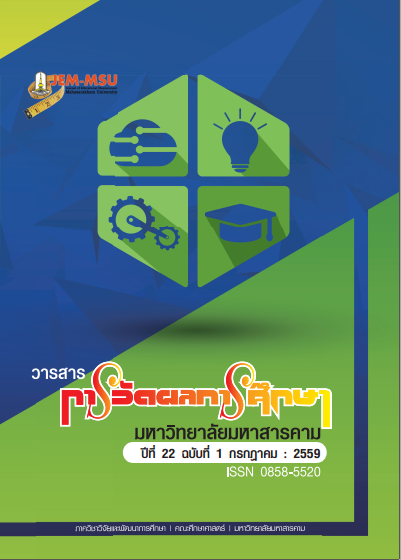The Development of Learning Management Model to Enhance Fundamental Thinking Skills, for History Content Strand of Prathomsuksa 4-6 Students
Main Article Content
Abstract
The research purposes were : 1) to study problems and the ways of developing the
learning management model in history content strand, to enhance fundamental thinking
skills for Prathomsuksa 4-6 students, 2) to construct and develop the learning management
model to enhance fundamental thinking skills for students, 3) to study the results of
learning management model to enhance fundamental thinking skills for students, which
were consisted of : 3.1) to find out the efficiency of learning management model, 3.2) to find
out the effectiveness index of learning management model, 3.3) to compare fundamental
thinking skills of students between before and after learning based on that learning
management model, 3.4) to compare fundamental thinking skills of students between who
learned based on that learning management model and control group. This research was
conducted by using methodology of the Research and Development approach. The
population consisted of 2,330 students in Prathomsuksa 4-6 level from 50 schools in the
area of Rattanaburi district, under the Office of Surin Primary Educational Zone 2, the
samples and target group used in this study comprised of teachers and students, those were
: 1) 15 teachers and 45 students who supported for the relevant information through
interviewing, 2) 90 teachers provided for replying questionnaire and 3,249 students who
provided to take the tests for basic thinking skills, 3) 15 teachers who were responsible in
social studies and provided for collaborating in focus group to analyze problems and needs
in developing for basic thinking skills, 4) 49 students for trying - out learning management
model, which were obtained from three class levels, and 5) 81 students of experimental
group, which were assigned for 22, 24, and 35 students in each group for grade 4-6 levels,
and 78 students of control group, those were provided using cluster random sampling
technique. The instruments used in gathering data were : 1) interviewing forms for teachers
and students opinions about problems and needs in developing learning management, 2)
questionnaire for teachers’ opinions, and 3) the tests of student’s fundamental thinking
skills, were composed of 3 packages classified for each level. The statistics were used in
data analysis consisted of mean, standard deviation, percentage and testing hypothesis with
dependent sample t-test and independent sample t-test.
The results of the study were found as the following :
1. The results of studying for current state, problems, and the ways of developing
the student’s basic thinking skills in grade 4-6 level found that, 57.07 percents of the students
who got lower score than 50 percent of total score. Whereas, the current state of problems
and approaches to develop fundamental thinking skills for students found that the relevant
teachers had yet problems in learning management to encourage for fundamental thinking
skills at a high level. Including suggestions for provision of learning activities based on the
credible and appropriate principles and approaches for improving thinking skills successfully.
2. The construction of learning management model to enhance basic thinking
skills for Prathomsuksa 4-6 students based on synthesizing of relevant ideas and supportable
theories composed of, 1) Connectionism theory, 2) Discovery learning theory, 3) Constructivist
learning theory, 4) Problem solving approach, 5) Inquiry learning, 6) Collaborative learning
theory, and 7) Brain-Based learning. For the results of synthesizing learning management
model were comprised of principles and theory approaches, objectives of model, learning
peocess, learning concepts, principles and learning encouraged system, and conditions of
implementing in learning management. Whereas, learning process in developing model had
5 stages and were as : 1) preparation stage, 2) encouter the problems and connecting with
reasonable thought stage, 3) disscussion and conclusions stage, 4) generalization of knowledge
stage, and 5) reciprocity and appraisal stage, which provided for 20 plans in learning
management. Additionally, conducting with connoisseurship focus of experts for judgment
the quality and appropriateness of learning management model, was found that model had
average score at a high level. Then the result in trying-out of model had efficiency in
learning management which clasified by class level of Prathomsuksa 4-6 were 79.81/78.75,
77.41/76.88, and 78.56/77.94 respectively, and also for their effectiveness indices were 0.56,
0.59, and 0.61 respectively.
3. The results of implementing learning management model found that : 1)
learning management model which classified in implementing of each class level had
efficiencies of 83.09/82.75, 79.80/79.38, and 84.37/81.43, whereas, showed of effectiveness
indices of 0.63, 0.64, and 0.66 respectively. 2) The students who learned based on developing
model in each class level showed higher basic thinking skills than before learning at the .01
level of significance. 3) Students who learned based on developing model in each class
level showed higher basic thinking skills than control group those learned based on
traditional approach, at the .01 level of significance.
Article Details
The content and information contained in the published article in the Journal of Educational Measurement Mahasarakham University represent the opinions and responsibilities of the authors directly. The editorial board of the journal is not necessarily in agreement with or responsible for any of the content.
The articles, data, content, images, etc. that have been published in the Journal of Educational Measurement Mahasarakham University are copyrighted by the journal. If any individual or organization wishes to reproduce or perform any actions involving the entirety or any part of the content, they must obtain written permission from the Journal of Educational Measurement Mahasarakham University.


